The US House of Representatives on Tuesday passed the Taiwan Assurance Act of 2019 and House Resolution 273 reaffirming the US’ commitment to Taiwan and the implementation of the Taiwan Relations Act (TRA).
The Taiwan Assurance Act was passed without objection, while the resolution was carried in a vote of 414 votes in favor, zero against and 17 abstentions.
“It is the sense of [the US] Congress that Taiwan is a vital part of the United States free and open Indo-Pacific strategy,” the Taiwan Assurance Act reads.
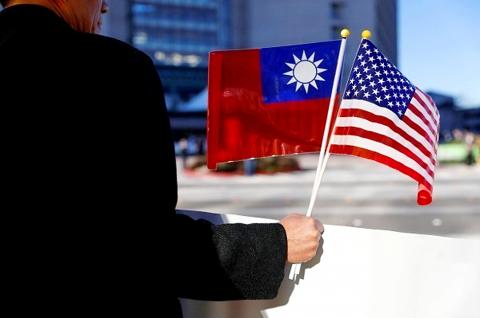
Photo: Reuters
The US should “conduct regular sales and transfers of defense articles to Taiwan in order to enhance its self-defense capabilities, particularly its efforts to develop and integrate asymmetric capabilities, including undersea warfare and defense capabilities, into its military forces,” it says.
In the fourth section on “Taiwan’s Inclusion in International Organizations,” the Taiwan Assurance Act says that it is US policy to advocate for the nation’s “meaningful participation” in international bodies “as appropriate,” giving as examples the UN, the World Health Assembly, the International Civil Aviation Organization and the International Criminal Police Organization, commonly known as Interpol.
It is also US policy to advocate for Taiwan’s membership in the Food and Agriculture Organization, UNESCO and “other international organizations for which statehood is not a requirement for membership,” it says.
It requires the US secretary of state to review the US Department of State’s guidance governing relations with Taiwan, including its “Guidelines on Relations with Taiwan” and other documents, and to reissue the guidance to the US government’s executive branch departments and agencies within 180 days of enactment.
Meanwhile, the resolution says that the TRA and the “six assurances” have been “essential components in helping to maintain peace, security and stability in the Western Pacific,” and are “cornerstones” of US policy toward Taiwan.
The House encourages mutual visits between US and Taiwanese officials, per the Taiwan Travel Act that was signed into law in March last year, the resolution says.
It also reiterates that the US president should conduct “regular transfers of defense articles to Taiwan consistent with Taiwan’s national security requirements in accordance to prior legislation.”
It calls on the secretary of state to “actively engage internationally in support of Taiwan’s meaningful participation in international organizations engaged in addressing transnational threats and challenges,” and recognizes Taiwan’s “partnership in combating global terrorism.”
In Taipei yesterday, Presidential Office spokesman Xavier Chang (張惇涵) thanked the House for its support, saying that the passage of the resolution is especially important on the 40th anniversary of the TRA.
Calling the US Taiwan’s “most important partner in the international community,” Chang said that the government’s efforts over the past three years have allowed it to be seen as a reliable partner in maintaining the “status quo” of regional peace and stability.
Taiwan’s strategic importance is no longer restricted to the Taiwan Strait, but now includes the Pacific, he said.
Taiwan would continue to play a role in maintaining the “status quo” of regional peace and stability with its partners, he added.
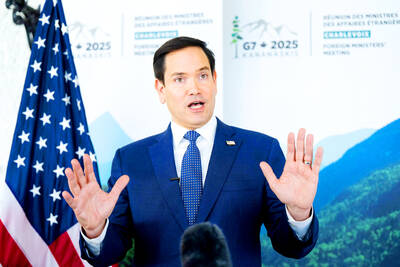
‘CROWN JEWEL’: Washington ‘can delay and deter’ Chinese President Xi Jinping’s plans for Taiwan, but it is ‘a very delicate situation there,’ the secretary of state said US President Donald Trump is opposed to any change to Taiwan’s “status quo” by force or extortion and would maintain that policy, US Secretary of State Marco Rubio told the Hugh Hewitt Show host on Wednesday. The US’ policy is to maintain Taiwan’s “status quo” and to oppose any changes in the situation by force or extortion, Rubio said. Hewitt asked Rubio about the significance of Trump earlier this month speaking with Taiwan Semiconductor Manufacturing Co (台積電) chairman C.C. Wei (魏哲家) at the White House, a meeting that Hewitt described as a “big deal.” Asked whether the meeting was an indication of the
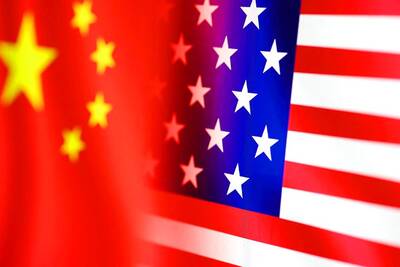
‘RELATIVELY STRONG LANGUAGE’: An expert said the state department has not softened its language on China and was ‘probably a little more Taiwan supportive’ China’s latest drills near Taiwan on Monday were “brazen and irresponsible threats,” a US Department of State spokesperson said on Tuesday, while reiterating Washington’s decades-long support of Taipei. “China cannot credibly claim to be a ‘force for stability in a turbulent world’ while issuing brazen and irresponsible threats toward Taiwan,” the unnamed spokesperson said in an e-mailed response to media queries. Washington’s enduring commitment to Taiwan will continue as it has for 45 years and the US “will continue to support Taiwan in the face of China’s military, economic, informational and diplomatic pressure campaign,” the e-mail said. “Alongside our international partners, we firmly
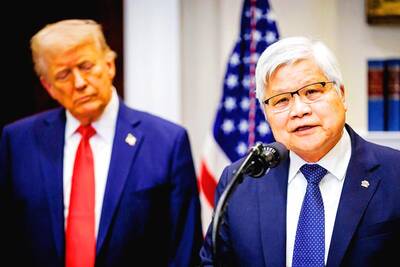
KAOHSIUNG CEREMONY: The contract chipmaker is planning to build 5 fabs in the southern city to gradually expand its 2-nanometer chip capacity Taiwan Semiconductor Manufacturing Co (TSMC, 台積電), the world’s biggest contract chipmaker, yesterday confirmed that it plans to hold a ceremony on March 31 to unveil a capacity expansion plan for its most advanced 2-nanometer chips in Kaohsiung, demonstrating its commitment to further investment at home. The ceremony is to be hosted by TSMC cochief operating officer Y.P. Chyn (秦永沛). It did not disclose whether Premier Cho Jung-tai (卓榮泰) and high-ranking government officials would attend the ceremony. More details are to be released next week, it said. The chipmaker’s latest move came after its announcement earlier this month of an additional US$100 billion
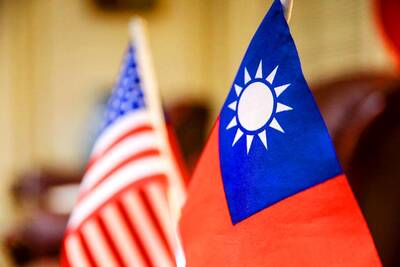
COUNTERING THE PLA: While the US should reinforce its relations with partners and allies, Taiwan must invest in strengthening its defenses as well, Phillip Davidson said If influence in the Indo-Pacific region is one of the US’ core interests, then Taiwan serves as a cornerstone of US economic and security influence in the region, former US Indo-Pacific Command commander admiral Phillip Davidson said on Thursday. “China’s ... strategy is to supplant the US leadership role in the international order ... and they’ve long said ... that they intend to do that by 2050,” Davidson told the National Review Institute’s Ideas Summit in Washington. Davidson said he had previously told US Senate hearings on China’s military activities and possible threats in the Indo-Pacific region that a Chinese invasion of